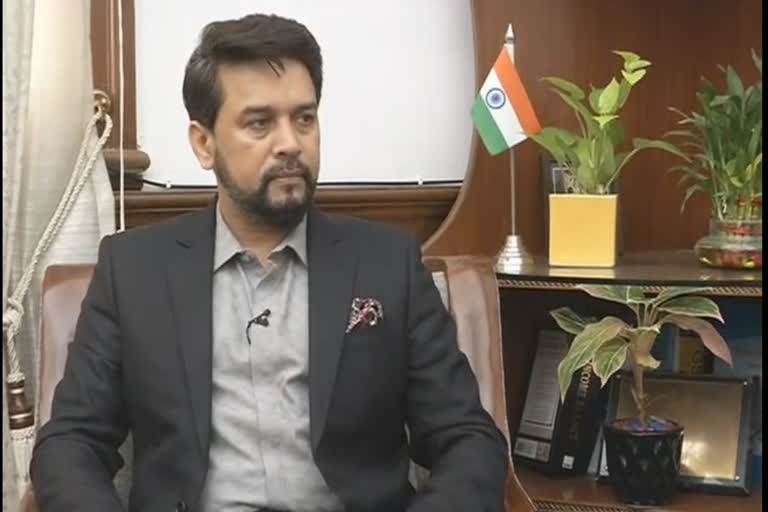New Delhi: The NDA government has strongly defended the decision to privatise public sector banks. In an exclusive interaction with ETV Bharat’s Krishnanand Tripathi, minister of state for finance Anurag Thakur defended the privatization move, saying that after privatisation, the size of public sector banks will become bigger, leading to the creation of more jobs and better facilities for customers. The minister said Prime Minister Modi’s government-backed the public sector banks in the last six years but now it was time to focus on providing better facilities to the public such as education, health and clean water rather than infusing capital in government banks to save them. The minister also rejected the speculation that four banks have already been identified for privatization. Edited excerpts:
Q: What is the criterion for identifying the banks for privatization?
A: It’s a very simple process, the NITI Aayog decides which are the high priority sector, which are the low priority sector, and which PSUs are to be taken for strategic sale. Then it comes to the department which decides which PSUs are to be taken for asset monetisation, how many shares of which PSU are to be sold, which PSU disinvestment will entail the transfer of management control etc. Then the government evaluates how much money it can get by disinvestment proceed which will be spent by the government for the social upliftment of the people.
We have talked about only two public sector banks and one public sector insurance company that they will be offered for sale. Disinvestment will also lead to the development of the banks, they will also get the opportunity to increase their market share, more people will get employment in those banks, the size of banks will increase and the facilities offered to the public will also improve.
Q: The BMS has criticised the privatisation drive.
A: Banks hold consultation with stakeholders, all the apprehensions that were there before the mergers were allayed. You also need to keep in mind that the public money is being used for capitalisation of these banks. The government invested Rs 3.5 lakh crore to Rs 4 lakh crore in these banks between 2014 and 2020. One has to look at the priorities of the government. There are several private sector banks that are ahead of public sector banks in the rollout of the government's social welfare schemes.
We need to see this, where to deploy the revenue collected by the government. People need health, education facilities, they need roads, they also need other facilities like water. Whether the government should spend money on these facilities or on the capitalisation of the bank? The government provided capital to the banks too, strengthened them, we also brought the banks out of the prompt corrective action (PCA) framework, we are also taking them forward. The issue is whether we need so many banks in the public sector. This is the larger question?
Q: Privatization of Visakhapatnam Steel Plant is facing strong criticism.
A: Manmohan Singh government was blamed for policy paralysis. However, when a large number of good decisions are taken in the Modi government then it is also criticised. If the country is to be taken forward, more employment is to be generated, if the companies are not doing well then there is a need to increase their size. Now the government will have to decide its priorities, and we have identified our priorities.
READ: Govt likely to move bill on cryptocurrency: Minister
Q: What is the government's plan to regulate cryptocurrencies?
A: The government formed an inter-ministerial committee on the issue which has given its report. Thereafter, a group of secretaries in the leadership of cabinet secretary also submitted its report which will be submitted to the Union cabinet. If the Cabinet approves it then the government may introduce a cryptocurrency bill in the current session to enact a law to regulate cryptocurrencies in the country.
Q: The issue of levying tax on tech giants like Google, Facebook, Microsoft, LinkedIn and Twitter is also widely discussed. What is update on that?
A: Earlier there was no tax on them, now there is a tax. These companies argue that a lot of ads are published on their platforms throughout the world and it's a difficult question to determine how much of it is being published from within the country. Revenue department looks at the issue from the revenue generation point of view. Why would we deny any opportunity to earn more revenue for the government?
Q: What Govt is doing to tackle long-term health challenge of waterborne diseases?
A: It's true that 75-80% of diseases are caused due to the use of unclean water. It's the tragedy of this country that women still need to walk for several kilometres to fetch water. Even in national capital Delhi, there is a problem of lack of clean water in several colonies. Government of India believes that the sustainable development goals (SDG), which have the target year of 2030 for several countries, are important. Under those goals, we are also working in that direction, it is called WASH - Water, Sanitation and Hygiene, so we are working for clean water, sanitation and hygiene.
Q: High excise duty on petroleum products is being criticized by the opposition.
A: The Centre alone does not levy duty on petroleum products, States also collect their taxes so it's not fair to blame the Centre alone for the high tax rate on petroleum products. State governments should also show some consideration.
Q: Any plan to further rationalize the GST rates?
A: GST rates are decided by the GST Council having the representation from State governments and they tweak the rate from time to time. But I personally believe that there should be only one tax rate rationalisation in a year and it should only be changed in those cases where there is a need for correcting the tax rate.
READ: Rising edible oil prices: Its time India focus on domestic production



